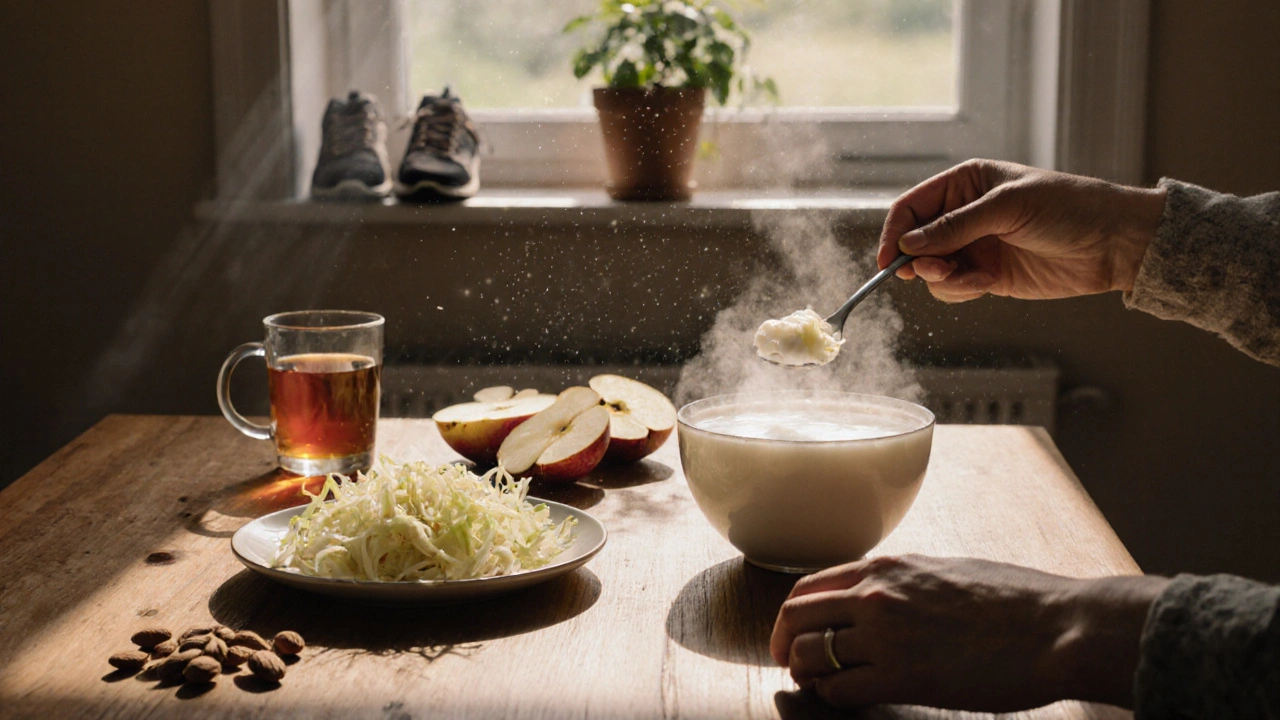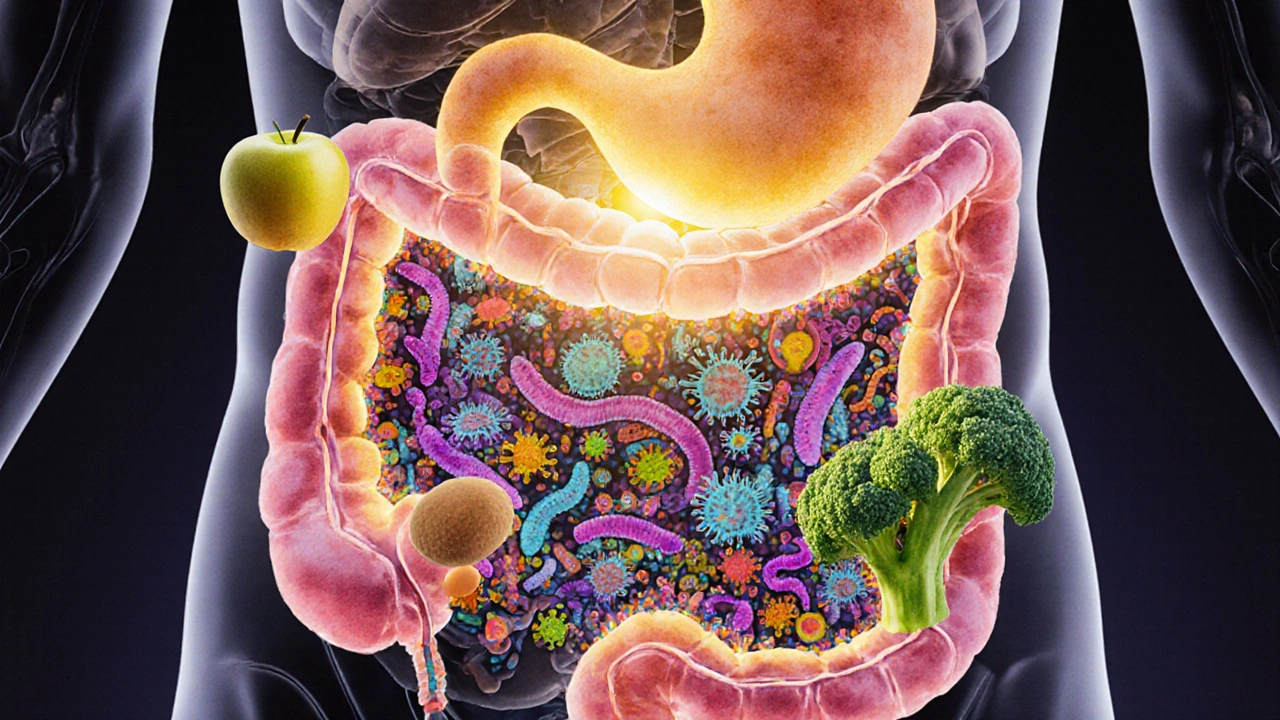Gut Health Score Calculator
Gut Health Assessment
Answer these questions about your daily habits to calculate your gut health score. Your score will reflect how well your habits support your microbiome and immune system.
Your Gut Health Score
Personalized Recommendations
What if the key to fighting off colds, allergies, and even chronic inflammation isn’t in your vitamins or your hand sanitizer-but in your belly? Most people think of the immune system as a network of white blood cells and lymph nodes. But the real powerhouse, the one that trains and directs your body’s defenses, lives in your gut. It’s not just about digestion. Your gut is your first line of defense-and it’s doing most of the work while you sleep, eat, or stress out.
Your Gut Is a Living Ecosystem
Your intestines hold trillions of bacteria, fungi, and viruses. Together, they form your microbiome-a complex community that’s as unique as your fingerprint. And it’s not just hanging out there. These microbes are active players in your health. They help break down fiber you can’t digest, produce vitamins like B12 and K, and even make neurotransmitters that affect your mood.
But here’s the kicker: about 70% of your immune cells live in your gut lining. That’s not a coincidence. Your gut doesn’t just absorb nutrients-it constantly talks to your immune system. It tells your body what’s food, what’s harmless, and what’s a threat. When this communication breaks down, your immune system gets confused. It starts attacking harmless things like pollen or your own tissues. That’s how allergies and autoimmune conditions begin.
How the Gut Trains Your Immune System
Think of your gut as a school for immune cells. Every day, your immune cells meet different microbes through the gut lining. Some are good. Some are bad. The gut teaches your immune system to recognize the difference. Friendly bacteria like Lactobacillus and a genus of beneficial bacteria commonly found in yogurt and fermented foods, known for supporting digestion and immune balance send signals that calm inflammation. They tell your immune cells: “This is safe. Don’t react.”
When you eat processed foods, sugar, or artificial sweeteners, you starve the good bacteria. Harmful ones take over. These bad actors damage the gut lining, creating tiny leaks-what doctors call “leaky gut.” Now, undigested food particles and toxins slip into your bloodstream. Your immune system sees them as invaders and goes on high alert. Chronic inflammation follows. That’s why people with irritable bowel syndrome often have more allergies. It’s the same root problem.
What Kills Your Gut Health
It’s not just junk food. Modern life quietly undermines your gut every day:
- Antibiotics wipe out good and bad bacteria alike. Even one course can change your microbiome for months.
- Chronic stress shuts down digestion. Your body doesn’t prioritize gut function when it thinks it’s under attack.
- Low-fiber diets starve the microbes that keep your gut lining strong. Most people eat less than 15 grams of fiber a day. Experts recommend 25-38 grams.
- Artificial sweeteners like sucralose and aspartame don’t just fool your taste buds-they disrupt bacterial balance. A 2023 study in Nature showed they reduced beneficial bacteria by up to 40% in just two weeks.
- Chronic sleep loss alters gut bacteria composition. People who sleep under six hours a night have less diversity in their microbiome.
These aren’t minor issues. They’re silent killers of immune resilience. And they’re everywhere.

What Heals Your Gut
Healing your gut isn’t about expensive supplements or extreme diets. It’s about simple, daily habits that support the microbes you already have.
- Eat more fiber-rich plants-beans, lentils, oats, broccoli, apples, berries, and whole grains. Aim for 30 different plant types a week. That’s not a myth. A 2021 study in Cell found that people who ate 30+ plants weekly had far more diverse gut bacteria-and stronger immune markers.
- Include fermented foods daily: sauerkraut, kimchi, kefir, miso, and plain yogurt. These contain live cultures that help repopulate your gut. One serving a day is enough. No need to overdo it.
- Reduce sugar and processed foods. Sugar feeds the bad bugs. It’s that simple. Cutting back doesn’t mean going cold turkey. Start by swapping soda for sparkling water with lemon.
- Move your body. Regular walking, cycling, or even stretching boosts microbial diversity. A 2022 study showed athletes had more beneficial gut bacteria than sedentary people-even when diet was the same.
- Manage stress. Try 10 minutes of deep breathing each morning. Or walk outside without your phone. Stress doesn’t just feel bad-it changes your gut bacteria within hours.
You don’t need to overhaul your life. Just make one change at a time. Start with adding one extra vegetable to your dinner. Or swap your afternoon snack for a handful of almonds and an apple.
Probiotics: Helpful, But Not Magic
Probiotic supplements are everywhere. But they’re not a cure-all. Most contain only a few strains of bacteria. Your gut has thousands. Taking a pill won’t fix a broken ecosystem.
Probiotics can help in specific cases: after antibiotics, during travel, or with acute diarrhea. But they’re temporary guests. They don’t stick around unless you feed them with fiber. That’s where prebiotics come in. Prebiotics are the food for your good bacteria. Onions, garlic, asparagus, chicory root, and bananas are packed with them.
Forget the hype. Focus on food first. A spoon of sauerkraut with your lunch does more than a $40 capsule.
What Happens When You Improve Your Gut
People who fix their gut health don’t just stop getting sick-they feel different. Here’s what actually changes:
- Fewer colds and infections-immune cells become better at targeting real threats.
- Less bloating and gas-digestion becomes smoother and more predictable.
- Better mood and focus-gut bacteria produce serotonin, the “feel-good” chemical.
- Reduced skin issues-acne, eczema, and rosacea often improve when gut inflammation drops.
- More energy-your body stops wasting resources fighting false threats.
One woman in her 50s, who had chronic fatigue and seasonal allergies for 15 years, started eating fermented veggies daily and cutting out sugar. Within six weeks, her allergies disappeared. She stopped needing antihistamines. She didn’t take a single pill. Just food.

It’s Not About Perfection
You don’t need to eat kale every day. You don’t need to be a vegan or a biohacker. Gut health is about consistency, not extremes. Miss a day? Eat a banana tomorrow. Had pizza? Add lentils to your next meal. Your gut doesn’t care about perfection. It cares about patterns.
Think of your microbiome like a garden. You don’t need to water it every hour. But if you stop watering for weeks, the plants die. The same goes for your gut. Small, regular care keeps it alive-and your immune system sharp.
When to See a Professional
If you have ongoing diarrhea, constipation, unexplained weight loss, or severe bloating, see a doctor. These aren’t normal. Conditions like SIBO, Crohn’s, or celiac disease need medical diagnosis.
But for most people-those who just feel tired, get sick often, or have brain fog-the fix isn’t a prescription. It’s your plate.
Can gut health really affect my immune system?
Yes. About 70% of your immune cells are located in your gut. The microbes there train your immune system to recognize threats, reduce inflammation, and avoid overreacting to harmless substances like pollen or food. A damaged gut lining can lead to chronic immune activation, which is linked to allergies, autoimmune diseases, and frequent infections.
Do I need to take probiotic supplements?
Not necessarily. Most probiotic supplements contain only a few strains and don’t stick around long-term. Real improvement comes from feeding your existing good bacteria with fiber-rich plants and fermented foods like sauerkraut, kefir, and kimchi. Supplements may help after antibiotics or during travel, but food is more effective for long-term gut health.
How long does it take to improve gut health?
You can start seeing changes in as little as two weeks. Swapping sugary snacks for fruit or adding a serving of fermented food daily can shift your microbiome quickly. But deeper healing-like reducing chronic inflammation or improving immune function-takes 3 to 6 months of consistent habits. Patience matters more than speed.
Can stress really hurt my gut?
Absolutely. Stress triggers your body’s fight-or-flight response, which slows digestion and reduces blood flow to the gut. This starves beneficial bacteria and allows harmful ones to grow. Chronic stress is linked to leaky gut, bloating, and changes in bowel habits. Managing stress with breathing, walking, or sleep helps your gut recover.
Is there a connection between gut health and mental health?
Yes. Your gut produces about 90% of your body’s serotonin, a key mood-regulating chemical. Imbalances in gut bacteria are linked to anxiety, depression, and brain fog. Studies show that people with depression often have less diverse gut microbiomes. Improving gut health through diet and lifestyle can support better mental clarity and emotional balance.
What foods are best for gut health?
Focus on fiber-rich plants: beans, lentils, oats, broccoli, apples, berries, garlic, onions, and whole grains. Include fermented foods daily: sauerkraut, kimchi, kefir, miso, and plain yogurt. Avoid added sugars, artificial sweeteners, and ultra-processed foods. Diversity matters-aim for 30 different plant types per week.
Next Steps
Start today. Pick one thing: add a serving of fermented food to your lunch. Swap your afternoon soda for sparkling water with lemon. Take a 10-minute walk after dinner. Don’t try to fix everything at once. Your gut doesn’t need a revolution-it needs routine.
Small steps, repeated daily, rebuild your inner ecosystem. And when your gut thrives, your immune system doesn’t just survive-it becomes strong, smart, and steady.
